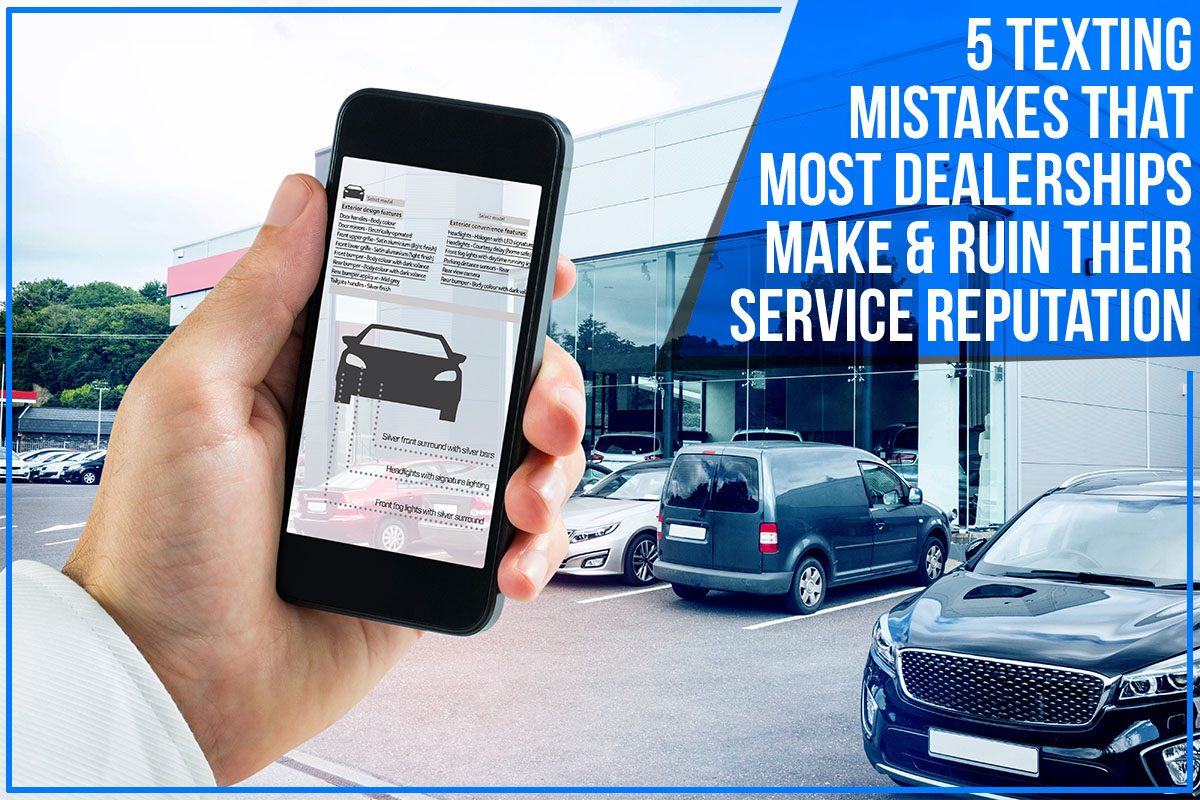
Texting is a powerful marketing tool used by auto dealerships, which is subject to unique regulations. Violation of these regulations may result in powerful financial consequences.
Texting can become an effective channel for communicating with customers if done correctly. However, many dealerships tend to refrain from this to avoid paying hefty fines.
What they fail to realize is, the issue is not with texting. The problem lies with improper or illegal texting. If you use this means the correct way, it can significantly benefit your car dealership.
Here are five mistakes that dealerships make that can ruin their service reputation.
Opt-Out Option
Many dealerships have been under fire for violating the Telephone Consumer Protection Act (TCPA) by not providing customers the option to opt-out of future text messages. Since consumers have to pay to receive text messages sent from a regulated cellular service to their personal cellphone network, random text messages can annoy them greatly.
In 1991, the TCPA was established. It prohibits businesses from establishing any form of unsolicited communication with customers through telephone technology. This law applies to text messages, robocalls, pre-recorded messages, and faxes.
A dealership must have prior written consent to contact a customer, among other guidelines, as highlighted by the TCPA. Otherwise, they might get penalties that canrange from $500 to $1500 per message.
To avoid problems due to legal violations, dealerships should use double opt-in, a double notification signifying that a customer has granted permission to send marketing text messages.
The first step is to obtain permission from customers to send them text messages through recorded verbal consent or a written or web form. Next, the dealership should send a text message to customers seeking consent for further text messaging. Generally, customers can reply with a Y or N response to show their approval or disapproval.
The double opt-out is basically follow-up communication like a text to confirm a customer’s consent for receiving text messages that may incur standard data fees, along with options to determine the type and frequency of text messaging.
Legal Compliance
Aside from TCPA, there are multiple state and federal laws and industry standards that dealerships should follow with text messaging. An example is contests and sweepstakes. These may be good marketing programs, but promoting them through text messages can lead to trouble.
All dealership customers need to opt in to receive promotions for contests or sweepstakes. Also, they need to indicate if they are 13 years of age or older and legally eligible to participate. If the contest or sweepstake is sponsored in conjunction with alcoholic-related content, then age verification of 21 years old and over is required.
Furthermore, dealerships need to distinguish between marketing messages and transactional messages and give customers the option to opt-in to one or both.
Employees’ Personal Cell Phones
Protecting confidential data and personal privacy has become the number one priority for businesses. Do not risk losing private business information or the personal data of your customers.
Use company text messaging numbers and plans to contact customers, so they never get your employees’ cell phone numbers or personal data. This way, the only thing customers will be able to access is their own information, so the privacy of your employees and dealership will be protected.
Collecting & Documenting Communications
The more dealerships rely on electronics, the riskier it gets for them since they no longer have a well-documented ‘paper trail’ if an employee leaves the job or to protect against legal liabilities.
Searching for a paper trail on various cell phones can be time-consuming, frustrating, and expensive. It will also highlight your inefficiency in front of customers. Use a service that safely stores, archives, and makes all internal and external communication easily searchable.
Unauthorized Work
The consumer protection laws of most states require dealerships to take prior customer authorization to perform auto repairs. If the repair is unauthorized, the customer might refuse to pay, which will cost the dealership time and money and result in poor customer experience, and possibly a lost customer.
Although many customers check the box in work orders for pre-authorization of additional repairs, they sign it without reading the document or understanding it. To avoid any unpleasantness, text the customer informing them of additional issues and request authorization to proceed. It is simple, quick, and verifiable.
We have a simple solution to all your dealership’s text messaging woes.
Singlethread offers a seamless automatic text messaging system to dealerships in Lincoln Park, MI, so your customers can stay updated about their vehicle status at every stage of the repair process. Click Here To Get A Free Live Demo.




